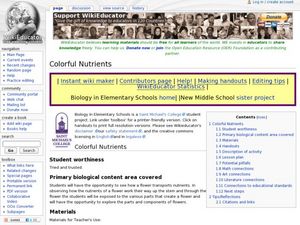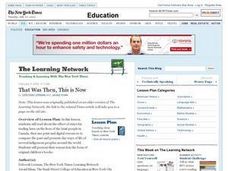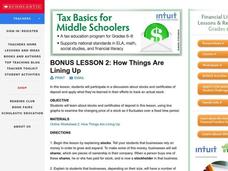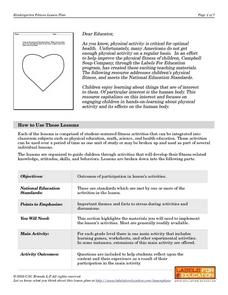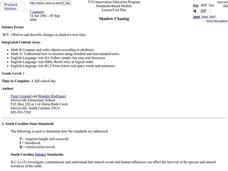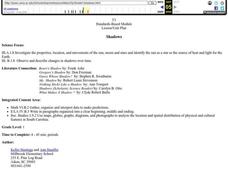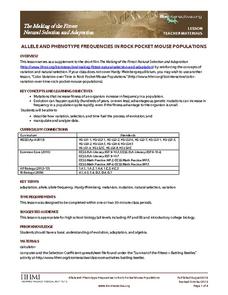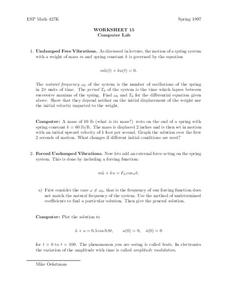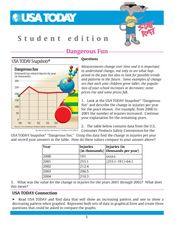Curated OER
Intro to the Coordinate Plane
Students identify the axes, quadrants of the coordinate plane and plot points on the plane. They take notes on the coordinate plane. Students and teacher go over examples of the coordinate plane. As an independent practice students...
Curated OER
Logistic Growth
Through the exploration of population growth of a bacteria population, high schoolers learn about and observe bacteria population over a 20 hour period. Students graph the population growth using a scatter plot and discuss its logistic...
Curated OER
Colorful Nutrients
Students participate in an experiment to understand how plants get nutrients. In this plant nutrition, lesson students examine how colored water goes through the stem of a plant to the flower. Students discuss the parts of the flower and...
Curated OER
Exploring History Through Photographs
Fifth graders compare and contrast photographs from the 1800s to those of 2003. In groups, they create drawings of how society has changed over time and use maps to locate local streets. Individually, they practice measuring the...
Curated OER
Making Music and Playing the Blues
Students research how musical instruments have changed over time. They discover how math is used in music. They describe musical instruments from photographs as well.
Curated OER
Artists, Architects, and Architecture
Students are introduced to the concept of architecture and how it has changed over time. In groups, they discuss how the places people have built reflects their values and needs. They use the internet to research the history of...
Curated OER
Growing Plants
Students grow plants and track their growth over time. In this growing plants lesson, students plant seedlings and chart their growth in a data analysis activity.
Curated OER
That Was Then, This Is Now
Young scholars examine the price of food over time. They analyze charts, perform math operations and compare and contrast data about the price of food. They complete worksheets while interperting the charts.
Curated OER
Math Munchers
Students identify the ones and tens values of a two digit number, while practicing chasing, fleeing, and dodging skills.
Curated OER
Math and Money
Students explore financial literacy. For this middle school mathematics lesson, students investigate income, taxes, and costs of living. Students investigate banking and use straightforward computation to learn about savings, simple...
Curated OER
Change the Beat
Brainstorm the reasons why a healthy heart is important. Using a diagram, label and locate the heart and discuss its function. Practice finding your heartbeat and describe the effects of physical activity on the heart. Also perform an...
Curated OER
Locating the Salt Front
Young scholars use Hudson River salinity data to create a line
graph that shows the location of the salt front, and use math
skills to explore how this location varies over time. They use the graph to estimate the location of the salt...
Curated OER
Shadow Chasing
First graders observe and measure their shadows. They go outside at three hour increments during the course of a day. Each time students measure and record the length of their shadows. Students read books about shadows and discuss why...
Curated OER
Guetemala's Changing Forest
Eighth graders compare their local ecological zone to the tropical rainforest. In this natural ecology lesson plan, 8th graders complete an activity about the differences in ecological zones. They compare their biome to the Guatemalan...
Curated OER
Air Pressure & Barometers
Fourth graders observe, measure, and record data on the basic elements of weather over a period of time (i.e., precipitation, air temperature, wind speed and direction, and air pressure). Then, they make a barometer and keep record of...
Curated OER
Shadows
First graders measure how a shadow changes over the course of a day. They write about what they would do if they lost their shadow, and make silhouettes of themselves. Students make up a shadow dance and read stories about shadows.
Curated OER
Allele and Phenotype Frequencies in Rock Pocket Mouse Populations
In the deserts of Arizona and New Mexico, some tiny creatures show just how quickly natural selection can turn a mutation into an advantageous adaptation. Watch a video about rock pocket mice, who show that one small change can make all...
Bowland
110 Years On
How many great, great grandchildren can one have? Scholars estimate the number of descendants a woman can have after 110 years. They use information about the average number of children per family and life expectancy to make this estimate.
Noyce Foundation
Truffles
Knowing how to scale a recipe is an important skill. Young mathematicians determine the amount of ingredients they need to make a certain number of truffles when given a recipe. They determine a relationship between ingredients given a...
Curated OER
Worksheet 15 Computer Lab
In this math instructional activity, students discuss the natural frequency ω0 of the system and how it is the number of oscillations of the spring in 2π units of time.
Curated OER
Dangerous Fun
In this line graph learning exercise, students analyze the data on a graph about toy-related injuries by year. Students solve 5 problems in which the change in injuries per year is calculated and recorded on a table.
Curated OER
Creating Line Graphs
Students relate data to coordinate graphs and plot points on this graph. They use minimum wage data to construct the graph. Students decide appropriate time intervals for the graphs. They share graphs with their classmates.
Curated OER
Grade 2 Spring Themed Word Problems: Problem 1
In this math worksheet, 2nd graders read and solve one story problem which involves addition of 2 digit numbers with carrying. There is a work space on the page for students to show calculations.
Teach Engineering
What Makes Our Bones Strong?
So is that what you meant by rubber legs? The activity has pairs subject a chicken bone to vinegar and observe what happens over a period of days. Individuals then write up a lab report and document their observations and findings.




